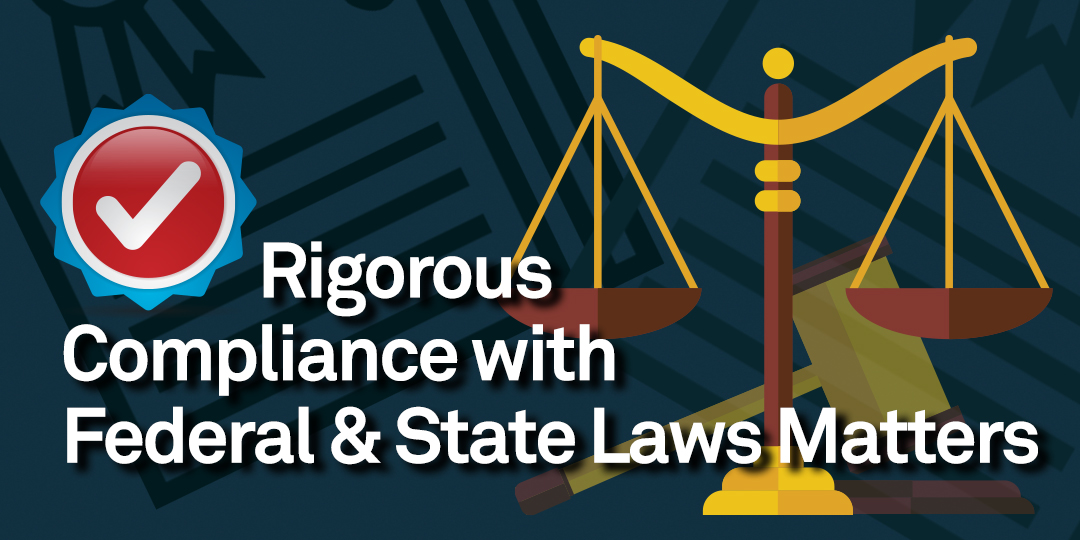It may seem obvious that understanding and complying with ERISA and PPACA federal regulations and state laws that govern healthcare claims and appeals is essential to a highly functioning reimbursement process. Contego believes it is not just obvious, but it is also good for the system, it keeps everyone accountable, and it is good for both the health and stability of the patients and physicians we serve.
Compliance Is a Mechanism for Systemic Balance
The law, the plan, and a claims and appeals process that rigorously complies with federal and state law drives appropriate reimbursement. This follows the intent of the federal government in establishing ERISA and PPACA. These are federal laws that set boundaries on claims processes in order to create a reasonably equitable systemic balance among patients, employers, physicians, and payers.
According to Kaiser Family Foundation Data, of the Americans whose healthcare plans fall under ERISA governance, 147 million pay for out-of-network benefits. Unused out-of-network benefits increase insurance carrier profits substantially. That being so, carriers pressure physicians to steer patients away from utilizing these out-of-network benefits that nearly 150 million Americans purchase in their employer-funded healthcare plans. Carriers also attempt to sound the alarm to their subscriber patients that using their out-of-network benefits will cost them severely – whether or not that will actually be the case.
Compliance with the intent and letter of ERISA, PPACA, and other state law protections act as a counterbalance to potential abuses. Compliance with the applicable laws enables providers (or in our case, a reimbursement expert) to compel insurance carriers to comply with the law and to properly adjudicate claims. Properly executed out-of-network claims and appeals yield significantly better reimbursements for providers and better outcomes for patients. That is the intent of healthcare laws – to ensure that the system functions properly and creates equity for all participants.
Dutiful Knowledge and Compliance Mitigates Risk
It is not enough just to follow the healthcare laws and guidelines that one can figure out easily. It is incumbent upon healthcare organizations to be proactive in continually acquiring awareness and knowledge of what is happening in federal and state healthcare laws. If that is not possible within the confines of a practice or surgery center, then obtaining external legal expertise is wise and can save headaches galore.
Expert legal compliance mitigates multiple risks. There is the risk of misapplying the law and paying the price for that, which can take an exacting toll. There is also the risk of missed opportunity for providers, such as elapsed timely filing requirements that the law prescribes. Perhaps most compelling for the majority of providers is the risk of allowing insurance carriers to unnecessarily deny claims and withhold payments. This is a painful risk and is a triple threat to providers. 1. It unreasonably rewards and enriches carriers, which makes them stronger. 2. It reduces adequate reimbursements for services rendered for the practice. 3. It risks patients not being able to obtain the service or procedure benefits for which they have paid.
Carrier processes are geared toward finding or manufacturing fault and creating additional hurdles. This is beneficial for their bottom line. If insurers can find fault, that will result in denial or underpayments. Once a claim is denied, insurance carriers are banking on providers’ inability to properly appeal. The risk is that providers are reimbursed less than the legal processes allow and carriers keep more than they would otherwise be entitled to keep.
Command Mastery of the Applicable Laws Promotes the Highest Quality of Care
Command mastery of these laws and regulations enables the end results the laws envision – the protection of the patient as well as the solid perpetuation of a healthy system. If providers are enriched at the expense of patients, employers, and/or insurers, then the system is not self-correcting. If insurers are benefitted at the expense of patients, employers, and/or providers, then the system is also not a self-correcting system. Mastery of federal and state healthcare process laws is the vehicle that ensures stasis in the system.
Ultimately, this stasis gives providers the knowledge that they will see adequate reimbursements for their services so they can provide the level of care they got into medicine to provide. With this knowledge, medical professionals can provide the medically necessary quality of care that will give their patients the best outcomes. Compliance ultimately matters because it enables the foundation upon which high quality medically necessary care is built.

